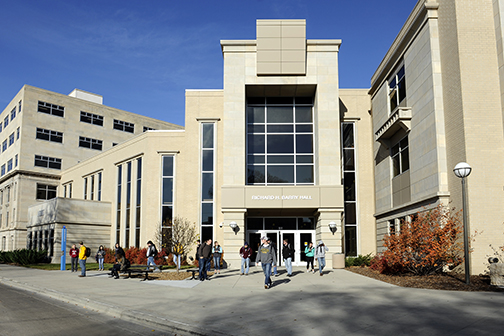Agricultural economics combines the technical aspects of agriculture with the business aspects of management, marketing, and finance. Students are prepared for a wide variety of exciting careers in the marketing of commodities sold and inputs purchased by agricultural producers; agricultural finance; and management of agribusinesses, farms and ranches. In addition, many graduates pursue successful careers in government service, economic development, commodity promotion and agricultural policy analysis.
The Program
The agricultural economics program emphasizes decision making, technical expertise and communication with a focus on agriculture and the food industry. Students are trained to be decision makers through course work and practical experience in agriculture, analytical and communication skills, team building, economic theory and agricultural policy.
The agricultural economics program is flexible. Students may complement required courses with classes from within the Department of Agribusiness and Applied Economics, as well as from other programs across campus. Students planning careers in production agriculture are encouraged to enroll in courses in crop and livestock sciences, precision agriculture, agricultural systems or other production-oriented courses within the college. Students wanting careers in the food industry may select courses in food science and food safety, transportation or business. Students wishing to work in agricultural education, communication or extension can add courses in production agriculture, education or communication to their programs. By working with their academic advisor, agricultural economics students can identify courses that allow them to pursue interests in renewable energy, risk management, rural economic development, finance and natural resource management. Agricultural Economics students will have the opportunity to take classes at NDSU’s state-of-the-art commodity trading room and learn to utilize the room’s information technologies. Regardless of student selection of elective courses, the agricultural economics program contains a common core of classes introducing students to economic theory, farm management, agricultural finance, crop and livestock marketing, quantitative methods, and laws and policies important to agriculture.
The Department of Agribusiness and Applied Economics also offers major and minor programs in agribusiness and economics. Students should refer to the agribusiness and economics fact sheets.
The Faculty
The department has 20 faculty members involved in teaching, research and extension. Our faculty have received numerous prestigious teaching and research awards, including the Burlington Northern Foundation Faculty Achievement Award; the Fargo Chamber of Commerce Distinguished Professorship Award; the Chancellor’s Award for Academic Leadership; the Western Agricultural Economics Association’s Outstanding Educator Award; the Premier Forecaster Award; the Eugene R. Dahl Excellence in Research Award, Senior Faculty; and the Teaching Award of Merit from the National Association of Colleges and Teachers of Agriculture. Faculty expertise varies across a wide range of specialties, including agricultural marketing, production, natural resource management, economic development, trade, finance, cooperatives and agricultural law.
Career Opportunities
Agricultural economics graduates have become loan officers; managers of farm supply, equipment firms and grain elevators; sales representatives with chemical, seed, feed and fertilizer companies; economists with state and federal agencies; and commodity merchandisers. About 30 percent of the graduates choose to farm and ranch. While many graduates remain in North Dakota or Minnesota, others begin careers throughout the nation and the world.
Financial Aid and Scholarships
Several $500 to $1,000 scholarships are available to outstanding freshmen entering the program each fall semester. Scholarships also are available to transfer students and students already in the agribusiness program at North Dakota State University.
The department annually awards over $140,000 in scholarships (ranging from $500 to $12,000) to students majoring in agribusiness and agricultural economics.
The College of Agriculture, Food Systems, and Natural Resources awards scholarships each year. For more information on scholarships, go to: https://www.ndsu.edu/admission/scholarships/.
Student loan, grant and work-study information is available from the Office of Financial Aid and Scholarships or One Stop.
Sample Program Guide
IMPORTANT DISCLAIMER: This guide is not an official curriculum. This guide is a sample four-year degree plan of how students might plan this major with other degree requirements to complete their education in four years.Student plans will vary from this sample due to a variety of factors, such as, but not limited to, start year, education goals, transfer credit, and course availability. To ensure proper degree completion, enrolled students should utilize Degree Map and Schedule Planner in Campus Connection and consult regularly with academic advisors to ensure graduation requirements are being met.

